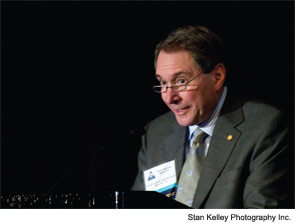MIAMI BEACH — Robert Ossoff, DMD, MD, said he “never in a million years,” as a young doctor, thought that he would be standing at a podium giving the presidential address to the Triological Society.
Now that he holds the position of society president, he can’t believe how much time has flown by. “Who would have ever appreciated how quickly the years would pass to get here?” Dr. Ossoff, executive medical director of the Vanderbilt Voice Center, told his audience on Jan. 26 at the Triological Society Combined Sections Meeting.
But that quick pace, he said, has brought to mind an issue that is often acknowledged by otolaryngologists as important but is not meaningfully acted on: finding a balance between work and other pursuits. Dr. Ossoff said that an off-kilter work-life balance is a significant problem and encouraged his colleagues to “prioritize goals to reflect professional and personal values [and] consciously set realistic expectations for yourself and others.”
Dr. Ossoff said that the job itself lays the foundation for a life that includes too much work and too little outside of work.
“Our profession sets us up to live in disequilibrium,” he said. “We have a long history of being lured into setting extremely high expectations of ourselves; in fact, anything less than perfection often sends us into a downward spiral.”
Challenging Schedules
Even for those who try to find this balance, there are tough challenges.
“As physicians, our work-life balance is so unpredictable,” he said. “We get caught up in life-and-death decisions. We take a call and unexpectedly return to the operating room.”
Technology has only added to the challenge, he said.
“Being at home today does not mean we are not at work: Technology advances have obliterated the boundary between work and home,” whether it’s a text message to a member of your family from grand rounds or following up with a patient from the symphony.
The frequent result of a lack of balance is burnout, which Dr. Ossoff described as a “state of fatigue brought about by a devotion to a cause, way of life or relationship that fails to produce the expected rewards.”
That can lead to feelings of helplessness, detachment, cynicism and negativity, which can all lead to other, more concrete problems.
“The costs of burnout are absenteeism, turnover, errors and an increase in malpractice cases,” he said. “More specifically, work satisfaction and marital satisfaction take a significant hit. And quality of life is markedly diminished.”
Solutions
Striking the balance takes a conscious effort, including planned flex time, setting realistic deadlines and doing personal things that can be overlooked, like exercising and getting medical care for yourself.

Leave a Reply